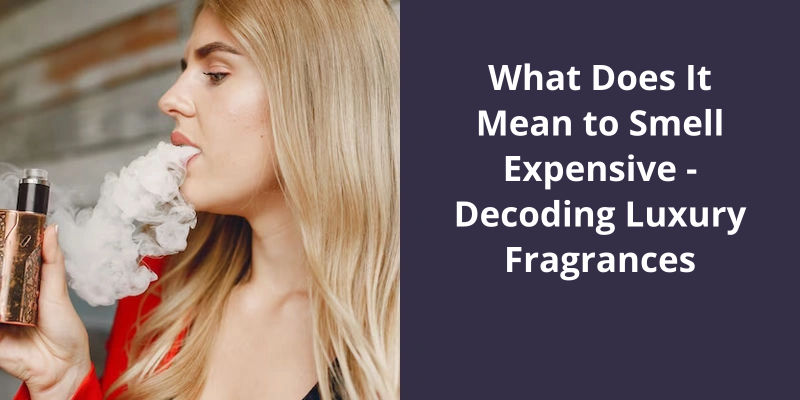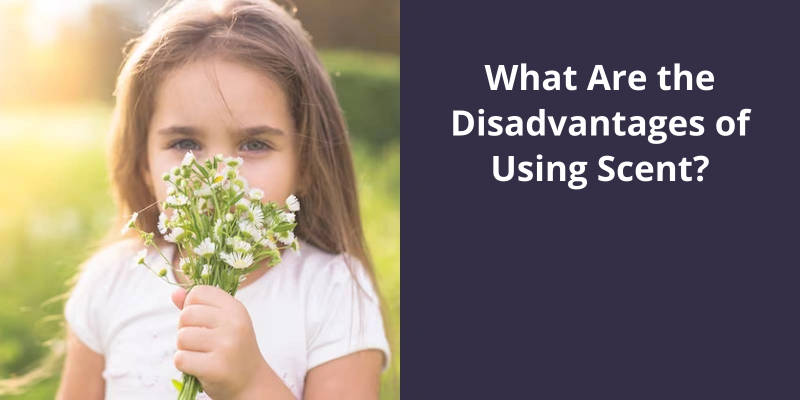When someone says that you “smell expensive,” it mainly refers to a scent that feels luxurious, sophisticated, and associated with a high-end brand. Such fragrance often has a unique and complex blend of notes, compared to the rather flat and synthetic smell of cheaper perfumes. They are typically crafted from high-quality, natural ingredients, often sourced from exotic locations, and are undergone rigorous process of extraction and blending. They tend to be long-lasting on the skin and transition smoothly from one note to another. These elements contribute to the perception of an “expensive” scent, mimicking the feel and experience of luxurious products.

What Notes Make a Perfume Smell Expensive?
One of the notes that make a perfume smell expensive is the use of rare and exotic ingredients. These could include rare flowers or leaves that are grown in specific regions of the world. The scarcity of these ingredients means that not many perfumes will include them, making the scent exclusive and luxurious. Additionally, the processing and extraction of these ingredients can be time-consuming and expensive, adding to the overall cost of the perfume.
The balance of the notes in a perfume is also crucial in creating an expensive scent. A well-crafted perfume will have top, middle, and base notes that blend seamlessly together. The top notes will provide an initial burst of fragrance, while the middle notes provide depth and complexity. The base notes will anchor the perfume, ensuring that the scent lasts for hours.
Finally, an expensive perfume will often have a beautiful bottle that complements the scent. The bottle will be made from high-quality materials, often decorated with intricate designs or precious stones. The design of the bottle will be carefully crafted to reflect the personality and style of the perfume, further adding to it’s luxurious feel.
These include the use of rare and exotic ingredients, high-quality raw materials, a well-balanced blend of notes, complexity of fragrance, and beautiful packaging. When these factors come together, they create a luxurious and exclusive scent that’s worth the investment.
How Do Perfume Makers Source Rare and Exotic Ingredients?
Perfume makers source rare and exotic ingredients through various channels such as partnerships with growers and suppliers, exploring international markets, and collaborating with local communities and perfumery experts.
When it comes to fragrances, it’s not just the price that sets them apart. Expensive perfumes tend to have a more intricate aroma, making them worth the extra money. Cheaper alternatives may smell pleasant, but they lack the complexity and uniqueness that high-end perfumes offer. So, does expensive cologne smell better? Let’s dive deeper into the world of fragrances to find out.
Does Expensive Cologne Smell Better?
On the other hand, expensive cologne contains a blend of high-quality ingredients that create a unique and intricate fragrance. Perfume makers use essential oils, floral extracts, and rare ingredients to craft a scent that’s one-of-a-kind. This process can take years to perfect, which is why the cost of high-end colognes is much higher than that of inexpensive colognes.
These houses invest heavily in research and development to create complex blends that appeal to consumers. They also rely on their signature ingredients and formulas that have been perfected over generations.
Overall, the answer to whether expensive cologne smells better than cheap cologne is subjective.
Source: How to Tell Cheap and Expensive Perfume Apart—A Guide
Luxury perfumes are more than just a pleasant scent – they’re a form of high-end art. With sophisticated blends of rare ingredients and unique scents, every luxury perfume is designed to make a statement. But what truly sets them apart from their budget-friendly counterparts is their complexity and depth, achieved through the use of multiple layers of fragrance notes. In this article, we’ll explore what makes a perfume truly luxurious and what to look for when choosing the perfect fragrance.
What Makes a Perfume Luxury?
In addition, luxury perfumes often come in intricately designed bottles made of high-quality materials like crystal, silver or gold. The packaging is part of the overall luxury experience, as it’s meant to enhance the aesthetic appeal of the perfume. The bottle may also feature unique details like engraved logos or gemstones, which further add to it’s luxurious appeal.
Luxury fragrance houses also typically have a strong brand reputation and image, which adds to the prestige of their products. These brands have often been around for many years and are synonymous with luxury, quality and exclusivity. Consumers aren’t just buying a fragrance, they’re investing in the heritage and history of the brand, as well as the quality of the product.
Furthermore, the ingredients used in luxury perfumes are often of higher quality and sourced from more exclusive locations. For example, some high-end perfumes contain rare essential oils like jasmine or oud, which can only be found in certain regions and are difficult to harvest. The use of these ingredients adds to the cost of the perfume and contributes to it’s luxurious status.
The production process for luxury perfumes is also more complex and time-consuming than that of budget-friendly fragrances. Each batch is carefully crafted and tested to ensure consistency in scent and quality. Perfumers may spend months or even years perfecting a single fragrance, which adds to the perfumes exclusivity and luxury status.
Our sense of smell is closely linked to our emotions and memories, which is why businesses have long recognized the importance of scent branding. From department stores to hotels, luxury brands have used the power of fragrance to convey elegance, sophistication, and exclusivity. And when it comes to luxury scents, there’s one aroma that reigns supreme: leather. In fact, according to a recent study, it’s the smell that two-thirds of people most strongly associate with a high-end experience. But what makes leather such a luxurious scent, and how does it impact our perception of a brand? Let’s take a closer look.
What Smell Is Associated With Luxury?
This connection between luxury and leather isn’t new. Starting in the 1800s, leather became a symbol of wealth and prestige. Leather goods, such as coats, handbags, and shoes, could only be afforded by the upper classes. The leather scent became synonymous with quality and exclusivity, as it was a material that only the wealthy could afford.
High-end car brands like Ferrari and Rolls Royce use leather to create a luxurious feel in their cars. Luxury hotels and stores have also started using leather scented candles and diffusers to create the same high-end feel in their establishments.
In addition to leather, other smells associated with luxury include exotic spices like cardamom, cumin, and saffron. The indulgent aroma of cocoa and vanilla is also associated with luxury, clearly explaining why expensive chocolates and desserts are considered a luxury.
There’s no absolute definition of the term “luxury scent”. However, fragrance experts suggest that luxury scents are those that convey a sense of exclusivity, quality, and refinement. Therefore, many high-end luxury perfumes use notes like caviar, champagne, or ambergris to create a luxurious aura that’s both opulent and refined.
Overall, the importance of smell is critical in the luxury industry. From the scents that fill high-end stores, indoor environments, to personal fragrances, the sense of smell helps to create an unforgettable and exclusive experience. The smells that we associate with luxury are crucial for brands who aim to create a high-end and sophisticated image. Done well, the right scent can turn an ordinary space or product into something that screams quality and luxury.
Conclusion
Ultimately, the concept of smelling expensive is a complex and subjective one that’s heavily influenced by personal preferences, cultural norms, and societal values. Whether one prefers the bold and opulent scents of high-end perfumes or the subtle notes of natural aromas, the sense of smell can evoke powerful emotions and memories that transcend our material possessions. In the end, the true value of scent lies not in it’s price tag, but in the personal meaning and significance it holds for each of us.





